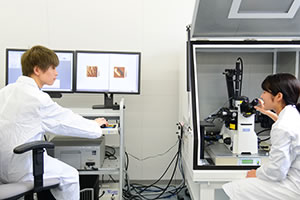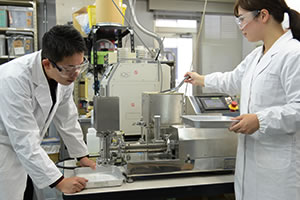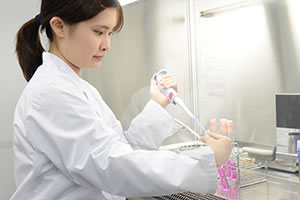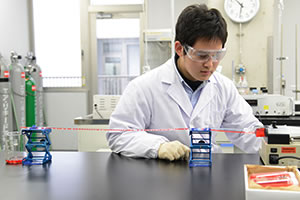Chemical Engineering
>>Chemical Engineering website
“‘Chemical Engineering’ is what we need for mono-zukuri (making of material objects).”
Knowledge of chemical engineering is essential to produce things that are essential to modern society.
Chemical engineering, which supports mono-zukuri around the world, contributes to the development of a wide variety of fields beyond the framework of chemical engineering, including global environment, resources, energy, medicine, and biotechnology.

“For those with a driving interest in learning about chemical engineering”
Chemical engineering is a discipline that systematizes the methodology for learning the basics not only of chemistry but also physics and biology to create new science and technology based on chemistry, and promote mono-zukuri to produce things that are useful in our daily life and society.
Chemical engineering is a discipline that is necessary in order to develop an entire manufacturing system to manufacture products from materials on an industrial scale by considering a process that is safe, environmentally-friendly and efficient, and by comprehensively taking into account the impact of products and wastes on the environment, how to secure resources and energy, and the establishment of a recycling-oriented society. Because of this nature of the discipline, chemical engineering has become important not only in the chemical industry but also in other industries, such as food, medicine, electronics, metals and automobiles, as well as energy industries, such as petroleum refining, electricity and gas. More recently, chemical engineering has been contributing to society, such as in developing new materials and ingredients, addressing challenging issues of life science, developing new resources and energies, and solving global environmental issues.
Researchers and engineers in chemical engineering deal with all processes and systems associated with chemical reactions with emphasis on the balance between substances and energies. They are engaged in the development of advanced chemical synthesizing technology, synthesizing systems for new substances and new materials using nanotechnology and biotechnology and their production systems, environmentally-friendly new energy systems, and innovative resource circulation systems for a recycling-oriented society.
Education and research in the department focus on developing specialists who not only have expertise in a specific field but also have all-round competence to be able to oversee the entire targeted chemical system and rationally design and assess it from a global perspective. Graduates of the department are playing an active role in a wide range of industrial fields.

Observation of the surface of living cells and measurement of their interaction forces with atomic force microscopy

Development of continuous kneading and granulation processes for food and pharmaceutical products

Experiment on the production of useful compounds by microorganisms

Rate analysis of gas-liquid reactions (red: water; transparent: gas)
Academic Staff
| Research Group | Staff |
|---|---|
| Particle science and technology group | Toshiyuki NOMURA [Professor] |
| Resources engineering group | Tomohiro IWASAKI [Professor] |
| Process systems engineering group | Satoru WATANO [Professor] Hideya NAKAMURA [Associate Professor] Shuji OHSAKI [Assistant Professor] |
| Chemical reaction engineering group | Hiroyasu OGINO [Professor] Ryosuke YAMADA [Associate Professor] Takuya MATSUMOTO [Assistant Professor] |
| Separation science and engineering group | Akinori MUTO [Professor] |
| Materials process engineering group | Takeyasu SAITO [Professor] Naoki OKAMOTO [Associate Professor] |
| Environment and energy process Engineering group | Masahiro YASUDA [Professor] Takafumi HORIE [Associate Professor] Erika OKITA [Assistant Professor] |
| Nano chemical systems engineering group | Yan XU [Associate Professor] |

